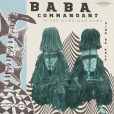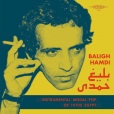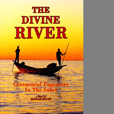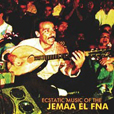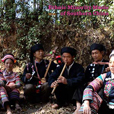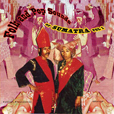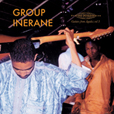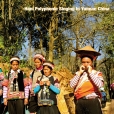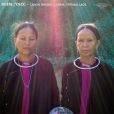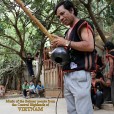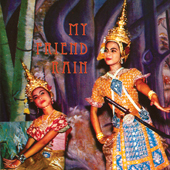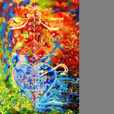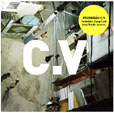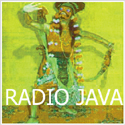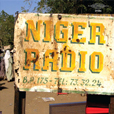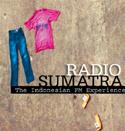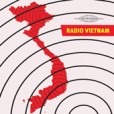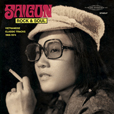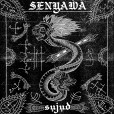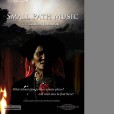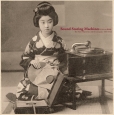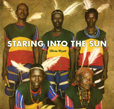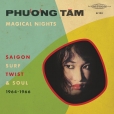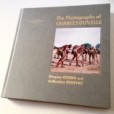Your basket is empty

‘After the afro-beat fury of Juguya, this second album combines a potent mix of traditional roots and modern Burkinabe funk with a reverent revival of the iconic Mandingue guitar music of the 1970s.’
Searing Sahelian dance music, recorded in Ouagadougou, Burkina Faso, in February 2018.
‘One of the most important Arabic composers of the twentieth century — writing for legends Umm Kalthum, Abdel Halim Hafez, Sabah, Warda, and many others — leading his own Diamond Orchestra, with Omar Khorshid on guitar, Magdi al-Husseini on organ, Samir Sourour on saxophone, and Faruq Salama on accordion. During this decade, Hamdi fully realized an international, hybrid music which incorporated beat-driven Eastern-tinged jazz, theremin-draped orchestral noir, Khorshid’s searing guitar solos, and a buzzing, sitar-based, Indo-Arabic psychedelic exotica… some of the hippest music of the era, anywhere.’
Shot between 2007 and 2012, Hisham Mayet’s film is an exhilarating, hallucinatory, harrowing record of music, ritual, life, and landscape along the Niger River, as it winds through Mali and the Republic of Niger.
Fantastic. Raw, blazing street music from Marrakesh. Electrified banjos and mandolins, drums, singing; amps run off moped batteries; the definitive interpretation of the Dana International hit Sabra And Shatilla.
Infectious songs and rootical instrumentals — the fifth SF album presenting Laurent ‘Kink Gong’ Jeanneau’s amazing documentation of the vanishing indigenous music of the rural Asian frontiers.
Limited, gatefold LP version of the first SF CD release in 2003: droning beat pop, early Orkes Melayu songs, Batak Tapanuli, traditional Minang, and rare folk drama from the Indonesian island, from cassettes.
‘Saharan trance stun guitar… a hypnotic choogle that rivals both the Magic Band’s early 70s marathon workouts and the Velvet Underground’s drone on tracks like Sister Ray.’
‘As with many other ethnic groups of the area, a traditional singing pattern is used with each singer adapting words to context. Many of these songs express intimate, strong emotions that bring tears to the performers while they are singing. The cascading mournful feel of this music is beautifully transcendent. You’ve never heard anything like it.
‘Instruments used by the ensemble include the babi (single tree leaf ) and mepa (tree leaf rolled up into the shape of a horn or mirliton), a chiwo (three-stringed bowed instrument), a labi (six-holed bamboo flute), a lahe (three-stringed small lute) and a meba (vertical reed instrument).’
Rawly ethereal, other-worldly singing by members of hill tribes in China, Vietnam, and Laos.
‘Dreamy musical segments, fleeting glimpses, odd sounds, temple shrines, decay, death, afternoon rains, and mysterious celebrations… from the Irrawaddy delta to humid nights on the streets of Isan province.’
‘Deben Bhattacharya (1921–2001) was a highly influential field recordist, poet, filmmaker, musicologist and amateur ethnomusicologist, based in Calcutta and Paris. He produced a vast number of LPs, CDs, videos and radio shows of traditional music from India, Asia, Africa, the Middle East, and Europe.
‘Never before published, Paris To Calcutta features over four hours of music and is Deben’s impressionistic account of a 1955 journey overland, in a converted milk delivery van, from France to India, collecting and exploring music along the Desert Road.
‘With four CDs of recordings, photographs, Deben’s original recording notes, musical transcriptions and more. An amazing glimpse into a time long gone and essential listening for anyone interested in folk and world music traditions.’
Vivid, unflinching film of two annual Haitian Vodou pilgrimages — for Ezili Danto, goddess of love, art and passion, and her old man Ogoun, god of war, iron, healing. Ecstatic, bloody, intensely musical.
Aka baile funk.
Dangdut, keroncong, jaipongan, rock, pop, disco, as well as theatre, commercials, DJs, news snippets, and other broadcast bits and pieces.
Pop, pissed-up sages, shout-outs to the missus, comedy skits intercut with Zarma string-playing, Denke-denke mollo from Burkina Faso, Malian kora, the Koran, Bori folk, Tuareg guitar, bits of BBC news…
Dangdut, melayu, gambus, punk, rap, psych, Islamic folk, you name it; with snatches of news, karaoke call-ins, ads, prayers and US-style station-IDs.
‘Every song is a mini-masterpiece, be it heavy acid rock psychedelia, horn and guitar drenched funk grooves, or gripping soul ballads reflective of life during wartime.’
‘The basic theme of the record can be summed up with one extremely powerful Bahasa Indonesian word, Tanah, which translates as ‘soil-ground-land-earth’. Shabara’s vocals are an expressive force, conjuring spirits from the soil with a deep, cosmic humility and respect for the land.
‘Suryadi has built a new guitar for these tracks and pushes the Senyawa sound into new territory, utilizing delay, loops, and other effects to constitute groundings of folk, metal, punk and drone, for Shabara to explore with his whispered poetry and jagged, sharp-as-a-kris animistic powers. There is simply no other sound like it.’
A miraculous bouquet of gagaku, shakuhachi, shamisen, storytelling, folksong and more, including the first commercial recordings in Asia.
Unflinching yet freewheeling and wildly poetic, Olivia Wyatt’s visually stunning film of thirteen Ethiopian tribes, complemented by a 136-page book of Polaroids and a CD of field recordings.

